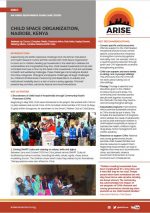Supported by the ARISE Responsive Challenge Fund, the African Population and Health Research Centre (APHRC) worked with Child Space Organization to reach out to children heading up households in the attempt to address the vulnerabilities and marginalities they face. Child headed households (CHHs) refer to families that have a minor as the head of the […]
